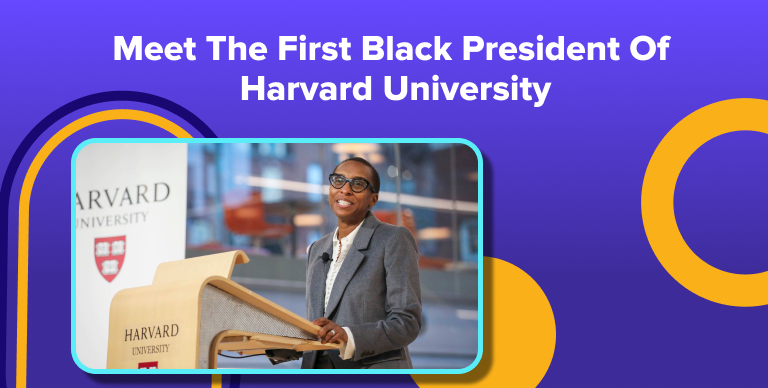The 30th President of Harvard University has been announced, selecting Claudine Gay from its own ranks. She became the first Black president in the university’s long history of almost 400 years.
Her appointment is seen as a historic moment, marking her as the second woman to lead Harvard. Upon this announcement, a wave of online celebrations emerged, with many offering congratulations and accolades to Claudine Gay.
In her acceptance speech, Gay emphasized the need for increased collaboration among Harvard’s various schools and stressed the urgency for the university to become more globally engaged.
She called for a commitment to innovative thinking when addressing our most pressing challenges.
Meet the First Black President of Harvard University
Dr. Claudine Gay’s remarkable journey is a testament to her unwavering dedication and academic excellence. From being the child of Haitian immigrants to becoming the 30th president of Harvard University, she has achieved an impressive path.
Growing up, she experienced a diverse upbringing, dividing her early years between New York City and Saudi Arabia. Her father worked for the U.S. Army Corps of Engineers, and her mother pursued a career as a registered nurse.
She earned recognition for the best dissertation in political science on completing her PhD in government at Harvard in 1998, followed by the prestigious Toppan Prize.
Her research primarily revolves around American political behavior, delving into subjects like voter participation and the dynamics of race and identity in politics.
Her career journey led her to Stanford University, where she served as an assistant professor and later as a tenured associate professor in the Department of Political Science.
In 2006, Harvard successfully recruited her back, appointing her as a professor of government and, later in 2007, as a professor of African American studies.
Over time, her roles expanded to encompass positions such as Dean of Social Studies. Eventually, she became the Edgerley Family Dean of the Faculty of Arts and Sciences.
During her tenure as Dean, Dr. Gay placed a strong emphasis on several crucial priorities for Harvard. These priorities included advancing faculty diversity, promoting interdisciplinary studies among students, encouraging collaboration among professors, and enhancing faculty involvement within the university’s community.
Dr. Claudine Gay’s remarkable journey serves as a source of inspiration, showcasing resilience in the face of adversity.
Past Presidents of Harvard University
Harvard University boasts a strong history dating back to its establishment in 1636.
Throughout its lengthy existence, Harvard has been guided by presidents who left indelible marks on education, politics, and society.
Their legacies persist in shaping the university’s core values and mission, making Harvard an enduring emblem of academic distinction and leadership.
One of its earliest presidents, Henry Dunster, stands out as the inaugural leader, serving from 1640 to 1654.
Increase Mather, Benjamin Wadsworth, and Edward Holyoke expanded the college’s curriculum and growth during the 17th and 18th centuries.
The 19th century brought visionary presidents such as Josiah Quincy, Edward Everett, and Charles Eliot to Harvard’s roster. They introduced academic reforms, cementing Harvard’s reputation as a research powerhouse.
Throughout the 20th and 21st centuries, leaders such as James Conant, Derek Bok, and Drew Faust worked to enhance Harvard’s global reputation and expand its campus. They made extra efforts to promote diversity among students, further cementing the university’s position as a leading institution.
How Many Black Students Are at Harvard?
Harvard College welcomed 1,968 students from a pool of 57,435 applicants for the Class of 2025, representing an historic low in their acceptance rate at 3.43%. In the previous year, 4.92% of applicants were admitted.
Harvard University remains dedicated to nurturing a diverse and inclusive community. African American or Black student enrollment increased from 14.8% to 18% in the previous class.
This shift highlights Harvard College’s ongoing efforts to create a campus that embraces diversity and inclusivity, regardless of their racial or ethnic background.
Who Is the First Female President of Harvard University?
Drew Gilpin Faust, the 28th president of Harvard University from 2007 to 2018, made history as Harvard’s first female president, despite not having a Harvard degree herself.
During her time in office, Faust made several notable achievements.
These included expanding financial aid to enhance accessibility for students from various economic backgrounds, advocating for increased federal funding for scientific research, and reintroducing ROTC to the campus.
Under her leadership, Harvard University extended its global presence, promoted the arts, embraced sustainability, and launched edX, an online learning partnership with MIT.
In addition to her administrative role, Faust is a distinguished historian specializing in the Civil War and the American South.
She played a pivotal role in transforming the Radcliffe Institute for Advanced Study into a multidisciplinary institute focused on exploring new knowledge at the intersection of traditional fields.
FAQs About Harvard University
Harvard University, renowned worldwide for its distinguished history, academic excellence, and accomplished graduates, often raises questions.
These FAQs shed light on Harvard University’s unique attributes and the application process for prospective students.
What Is Harvard University?
Harvard University is an Ivy League research institution located in Cambridge, Massachusetts, USA. Founded in 1636, it ranks among the world’s oldest and most prestigious universities.
How Can I Apply to Harvard?
To apply, you must complete an application through the Common Application, accompanied by standardized test scores, transcripts, recommendation letters, and essays.
What Are the Most Popular Fields of Study at Harvard?
Frequently chosen majors include Economics, Computer Science, Government, and Psychology, although Harvard offers a broad array of academic programs
What Is the Cost of Tuition at Harvard?
Tuition expenses can fluctuate, but for the 2022-2023 academic year, it stood at roughly $54,000. Nevertheless, Harvard boasts a financial assistance program, benefiting many students.
Can International Students Seek Admission to Harvard?
Harvard warmly welcomes international students and features a diverse community representing various nations.
Who Are Some Prominent Harvard Alumni?
Harvard boasts a lengthy list of distinguished alumni, encompassing political figures such as Barack Obama and John F. Kennedy, business luminaries like Bill Gates, and scholars like W.E.B. Du Bois.
Is It Challenging to Gain Admission to Harvard?
Harvard’s admissions process is highly competitive, with an acceptance rate around 4-5%. Evaluation is based on academic achievements, extracurricular involvement, and personal qualities.
Wrapping Up
In selecting Claudine Gay as its 30th president, Harvard University has made history by welcoming its first Black leader after nearly four centuries.
This historic moment not only breaks barriers but also signifies a broader commitment to diversity and progress.
As the second woman to hold this prestigious position, Claudine Gay stands on the shoulders of the many trailblazing leaders who have guided Harvard throughout its illustrious history.
Sign up for the full EDU Passport experience and get more free resources to boost education career.




















